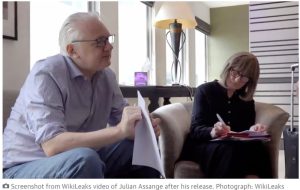Guess who is not coming to Margaret Thatcher’s funeral
- 12 April 2013
- Lindsey German
- United Kingdom
The importance of Margaret Thatcher’s warmongering is reflected in the Falklands theme of her funeral arrangements — something Tony Blair does not seem to regard as "tasteless".
Guess who is not coming to Margaret Thatcher’s funeral
- 12 April 2013
- Lindsey German
- United Kingdom
The importance of Margaret Thatcher’s warmongering is reflected in the Falklands theme of her funeral arrangements — something Tony Blair does not seem to regard as "tasteless".

By Lindsey German
Stop the War Coalition
12 April 2013

Margaret Thatcher rides on board a tank during an official visit to British forces in Germany, September 1986.
Tony Blair has denounced as ‘tasteless’ those celebrating the news of Margaret Thatcher’s death.
"Even if you disagree with someone very strongly," he said, "at the moment of their passing you should show some respect."
He may of course be thinking ahead to his own eventual demise and fearing that the scenes of partying will be reproduced on a much wider scale.
Blair’s demand that we all show respect for the dead is somewhat hard to take from the man incriminated in the deaths of hundreds of thousands of Iraqi and Afghan civilians.
I don’t recall a similar call from Blair over the recent lack of respect accorded by the British media to the Venezuelan president Hugo Chavez, when he died at a relatively early age after a long period of suffering cancer.
On the occasion of Margaret Thatcher’s death, calls for respect are attempts to stifle any criticism about a woman who, it should be remembered, was only able to hold office due to splits in the Labour opposition, rather than any enthusiasm for her or her party from a majority of voters.
And even many of those who voted for her had cause to regret it, as Paul Routledge points out in the Mirror:
She decimated our basic industries of coal and steel. Shipbuilding virtually disappeared, along with much of heavy engineering.
She tried to destroy our free trade unions through repressive legislation; She branded miners fighting for their jobs and communities as "the enemy within"…
She made mass unemployment respectable, and used it as a tool of government. The dole queues were "a price worth paying" under her regime – once described as "an elected dictatorship" by one of her own ministers.
She created a new underclass of jobless men… and forced millions of women back into the workplace so that families could make ends meet.
She sold our basic utilities – gas, water, electricity and telephones – and prices soared.
She flogged off the buses and railways, and fares went through the roof.
She sold off the council houses and built no new ones, so there are now more than two million families on housing waiting lists.
She enthroned the profit motive, and unleashed the spivs and speculators in the City of London.
She surrendered economic policy to the mysterious dark forces of "the market", which led UK plc into one recession after another that led to the mess where we are today.
She imposed the hated poll tax on the nation, first in Scotland where she made the Tories unelectable for more than a generation. She then thrust it down the throats of the English, prompting the worst riots in London since the disturbances of the early eighties.
Mass popular resistance to the poll tax finally marked her downfall, and Thatcher was driven out of office by her own party.
This is all supposed to be forgiven and forgotten as a nation unites in grief for a woman who, in the sickening words of David Cameron, ‘made Britain great again.’
Much has been written about her domestic policies, much less about her international role. Yet she played a crucial part in the escalation of the Cold War and in the reestablishment of a doctrine of intervention which began in the Falklands and continued with her successors in the 1990s and 2000s.
Respect for the dead was certainly not in Margaret Thatcher’s mind in 1982, when her popularity ratings were rock bottom and she took Britain into war with Argentina over the Falkland Islands, to save an isolated British colony — and her own political face. "Rejoice!" was Thatcher’s response at the end of a squalid and unnecessary colonial war that cost over 1000 lives, including those killed on the Argentinian ship the Belgrano — deaths celebrated by Thatcher’s cheerleaders at Rupert Murdoch’s Sun with the headline, "Gotcha".
The 323 young Argentinian sailors, mostly conscripts, who died when the Belgrano sank, will not be guests at Margaret Thatcher’s funeral.
Nor will the ten Irish hunger strikers who were allowed to die by Thatcher because she refused to countenance their demand to be treated as political prisoners. As Sinn Féin President Gerry Adams commented, "Here in Ireland her espousal of old draconian militaristic policies prolonged the war and caused great suffering… Margaret Thatcher will be especially remembered for her shameful role during the epic hunger strikes of 1980 and 81."
While Margaret Thatcher destroyed many industries, she always protected the arms industry, which she enthusiastically promoted abroad. Most notoriously, was her central role in negotiating the al-Yamamah (Dove of peace!) arms deal with Saudi Arabia in 1983. At the time, this was the biggest arms deal in British history. It was oiled with bribes and backhanders running into hundred of millions of pounds, one of the main beneficiaries being Thatcher’s own son Mark, who pocketed £12 million.
It is another example of how Margaret Thatcher was mentor to Tony Blair. When in 2007 a Serious Fraud investigation into the corruption involved in the arms trade got too close to defence company BAE’s dealings with Saudi Arabia, Blair ordered it to be shut down.
The establishment of the ‘new imperialism’ which became such a feature of the world from the 1990s, was paved by Margaret Thatcher, alongside US president Ronald Reagan. With him she helped escalate the Cold War in the 1980s, introducing Cruise missiles to Britian despite very widespread opposition.
The ‘special relationship’ cemented with Reagan allowed Tony Blair in particular to follow her in supporting US foreign policy at every turn, with disastrous consequences in Afghanistan and Iraq.
Like today, the ‘new imperialism’ was, proclaimed to be in the interests of spreading democracy. In reality, Thatcher had no problem in supporting dictatorships around the world, whether it be in Saudi Arabia or in Chile, where her good friend General Augusto Pinochet came to power in a blood-soaked coup against the democratically elected President Allende.
Pinochet reigned for two decades through a regime of oppression, torture and mass execution. The response of one Chilean woman to Margaret Thatcher’s death sums up the reaction of many in her country:
"The Thatcher government directly supported Pinochet’s murderous regime, financially, via military support, even military training. Members of my family were tortured and murdered under Pinochet, who was one of Thatcher’s closest allies and friend. Those of us celebrating are the ones who suffered deeply.”
When Pinochet found himself under house arrest in Britain in 1998, facing extradition to Spain to face charges of war crimes, Margaret Thatcher visited him to "thank her old friend for bringing democracy to Chile".
Chile’s President Allende, assassinated in Pinochet’s seizure of power, will not be a guest at Margaret Thatcher’s funeral.
Nor will the black South Africans slaughtered by the apartheid regime in the 1980s, when Margaret Thatcher branded Nelson Mandela a "terrorist" and did all she could to block the sanctions which most of the world imposed in response to the barbarity of the regime. "I have found myself to all intents and purposes alone in resisting sanctions,” she wrote in 1985 to PW Botha, the hardline apartheid president of South Africa.
During Thatcher’s governments, the UK repeatedly vetoed UN resolutions on apartheid South Africa. Unsurprisingly, the last white South African president, FW de Klerk, is expected to attend her funeral.
And what a gathering it is turning out to be. She said she didn’t want a state funeral, but she’s getting one in all but name anyway, with the Queen and Prince Philip in attendance. It will be virtually indistinguishable from the funeral of Sir Winston Churchill.
Previous prime ministers received no such accolade, including Harold Wilson who, like Thatcher, had three terms in office, and also led a reforming government, though somewhat different, as it included, for example, liberalisation of laws on censorship, divorce and homosexuality, and the ending of capital punishment.
This state funeral in all but name is a blatant attempt by David Cameron to boost his popularity through a bizarre "feel-good" opportunity, just as millions of people are learning the extent of the suffering his government’s austerity policies are causing the poorest and most vulnerable in our society.
The importance of Margaret Thatcher’s warmongering is reflected in her funeral arrangements which will have a Falklands War theme — something Tony Blair does not seem to regard as "tasteless". As ex-soldier Joe Glenton says, "Thatcher’s march to war in the Falklands won an election – and her funeral will process to the same jingoistic tune."
A funeral march with 700 women and men from the British armed services attending will proceed through the City of London — where there are plenty of Margaret Thatcher’s friends — to St Paul’s Cathedral. There will be gun salutes and full military honours, and the whole event will be another boost for the militarism which so pervades British society — one more occasion on top of Remembrance Day or the Queen’s Jubilee where the establishment praises the military and by extension drums up support for current and future wars.
The funeral will cost an estimated £10 million. On top of this, is hundreds of thousands more spent on recalling MPs to parliament for a seven hour tribute to Thatcher. The special convening of parliament was forced through against the wishes of the Speaker of the House of Commons, and the Labour MP Glenda Jackson was an almost lone voice in puncturing the endless praise of a prime minister who wreaked, in Jackson’s words, "the most heinous, social, economic and spiritual damage upon this country".
Margaret Thatcher was a multi millionaire. She died in the Ritz hotel, where she had lived for months, and had a house in Belgravia. It says everything about her values and of those who continue in her tradition today that this money can be spent at a time when the poorest and most disadvantaged in society are having their benefits cut, when inequality is growing and while most working people see their living standards fall.
Today, the friends of Thatcher and her ideoology of privatisation, economic neoliberalism and warmongering — from David Cameron to Tony Blair — justify arms spending, tens of billions wasted on the Trident nuclear missile system, continuing wars, and interventions in the Middle East, Africa and South Asia.
No wonder Tony Blair thinks it’s tasteless to criticise: he learnt everything he knew from her.
Follow StWC
Related
- Why would anyone celebrate the death of Margaret Thatcher? Ask her victims
- George Galloway: Behind the hagiography who was Margaret Thatcher and what did she really do?
- Don’t speak ill of the dead — unless it’s Margaret Thatcher. There’s nothing wrong with loathing her.
- Margaret Thatcher’s true legacy was the war criminal Tony Blair

Recent Posts

HUNDREDS KILLED AND INJURED IN GAZA TENT CAMP BY ISRAELI AIR STRIKES





